personal selling skill trainning
- 格式:docx
- 大小:19.26 KB
- 文档页数:6
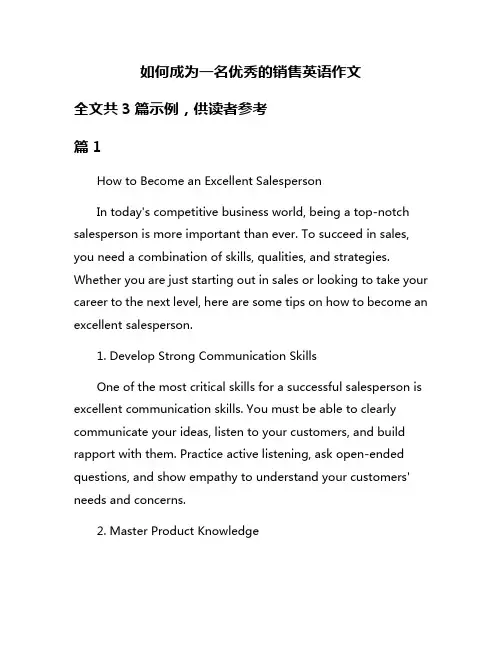
如何成为一名优秀的销售英语作文全文共3篇示例,供读者参考篇1How to Become an Excellent SalespersonIn today's competitive business world, being a top-notch salesperson is more important than ever. To succeed in sales, you need a combination of skills, qualities, and strategies. Whether you are just starting out in sales or looking to take your career to the next level, here are some tips on how to become an excellent salesperson.1. Develop Strong Communication SkillsOne of the most critical skills for a successful salesperson is excellent communication skills. You must be able to clearly communicate your ideas, listen to your customers, and build rapport with them. Practice active listening, ask open-ended questions, and show empathy to understand your customers' needs and concerns.2. Master Product KnowledgeTo be a successful salesperson, you need to have a deep understanding of the products or services you are selling. This includes knowing the features, benefits, and unique selling points of your offerings. Take the time to learn everything about your products or services so that you can answer any questions that your customers may have.3. Develop a Positive AttitudeA positive attitude is essential for success in sales. Stay optimistic, motivated, and enthusiastic, even in the face of challenges. Your positive energy will be contagious and will help you build relationships with your customers. Remember that rejection is a part of sales, so don't let it discourage you.4. Set Clear GoalsTo achieve success in sales, you need to set specific, measurable, achievable, relevant, and time-bound (SMART) goals. Whether it's reaching a certain sales target or closing a certain number of deals, having clear goals will help you stay focused and motivated. Break down your goals into smaller milestones and track your progress regularly.5. Develop Strong RelationshipsBuilding relationships with your customers is crucial for long-term success in sales. Take the time to get to know your customers, understand their needs, and build trust with them. Be responsive, reliable, and honest in your interactions. A strong relationship with your customers will lead to repeat business and referrals.6. Learn from RejectionsRejection is an inevitable part of sales, but it can also be a valuable learning opportunity. Instead of dwelling on rejections, use them as a chance to improve your skills and approach. Analyze what went wrong, ask for feedback, and adjust your tactics accordingly. Remember that every rejection brings you closer to a successful sale.7. Stay Updated with Industry TrendsTo stay ahead in sales, you need to stay informed about industry trends, market changes, and competitor activities. Keep up to date with the latest developments in your industry, attend conferences, read industry publications, and network with other sales professionals. This knowledge will give you a competitive edge and help you anticipate your customers' needs.In conclusion, becoming an excellent salesperson requires a combination of skills, qualities, and strategies. By developing strong communication skills, mastering product knowledge, maintaining a positive attitude, setting clear goals, building relationships, learning from rejections, and staying updated with industry trends, you can achieve success in sales. Remember that success in sales is not just about making a sale but about building lasting relationships with your customers.篇2How to Become an Excellent SalespersonSales is a challenging yet rewarding career that requires a combination of skills, knowledge, and personality traits. To become an excellent salesperson, one must be dedicated, persistent, and always looking to improve. In this guide, we will discuss the key elements that can help you become a top performer in the field of sales.1. Develop strong communication skillsEffective communication is essential for sales success. To excel in sales, you must be able to clearly and persuasively convey your ideas, explain complex concepts in simple terms, and actively listen to your customers' needs a nd concerns. It’simportant to be articulate, confident, and professional when speaking to prospects and clients.2. Understand your product or serviceTo be successful in sales, you must have a thorough understanding of the product or service you are selling. This includes knowing its features, benefits, and value proposition, as well as being able to articulate how it solves your customers’ problems or meets their needs. Customers will trust and believe in you if you can demonstrate your expertise and provide valuable insights.3. Develop a strong work ethicSales is a competitive field that requires hard work, dedication, and persistence. To succeed in sales, you must be willing to put in the effort to prospect for new leads, follow up with existing customers, and overcome objections. You must be disciplined and self-motivated, and willing to go the extra mile to achieve your goals.4. Build strong relationshipsBuilding and maintaining relationships with customers is crucial for long-term sales success. Customers are more likely to buy from people they know, like, and trust. To become anexcellent salesperson, you must focus on building rapport with your customers, understanding their needs, and providing exceptional customer service. By developing strong relationships, you can create loyal customers who will not only buy from you but also refer others to your business.5. Embrace continuous learningIn sales, the only constant is change. To stay ahead of the competition and adapt to evolving market trends, you must be committed to lifelong learning and self-improvement. This includes attending sales training workshops, reading books and articles on sales, and seeking feedback from mentors and colleagues. By continuously improving your skills and knowledge, you can stay relevant and competitive in the fast-paced world of sales.6. Set goals and track your progressTo achieve success in sales, it’s important to set clear, measurable goals and track your progress towards achieving them. This can help you stay focused, motivated, and accountable for your performance. By setting specific sales targets, such as revenue goals, conversion rates, or number of new leads generated, you can measure your success and identify areas for improvement.7. Stay positive and resilientSales can be a challenging and often frustrating profession. Rejection is a common occurrence, and not every prospect will say yes. To become an excellent salesperson, you must have a positive attitude, stay resilient in the face of rejection, and learn from setbacks. By maintaining a positive mindset and focusing on the long-term benefits of sales success, you can bounce back from setbacks and continue moving forward.In conclusion, becoming an excellent salesperson requires a combination of skills, knowledge, and personality traits. By developing strong communication skills, understanding your product, building relationships, embracing continuous learning, setting goals, and staying positive and resilient, you can achieve success in sales and become a top performer in your field. With dedication, hard work, and a commitment to excellence, you can reach your full potential as a sales professional.篇3How to Become an Excellent SalespersonSales is a competitive field that requires a combination of skills, knowledge, and determination to succeed. Whether you are selling products, services, or ideas, being a top-notchsalesperson requires a commitment to continuous improvement and a willingness to go above and beyond for your customers. In this article, we will explore the key traits and strategies that can help you become an excellent salesperson.1. Developing Strong Communication SkillsEffective communication is the cornerstone of successful sales. As a salesperson, you must be able to clearly articulate the benefits of your product or service, address customer concerns, and negotiate deals. To improve your communication skills, practice active listening, ask probing questions to understand your customers' needs, and learn how to tailor your message to resonate with different personalities.Additionally, mastering the art of non-verbal communication, such as body language and tone of voice, can help you build rapport with customers and convey confidence and professionalism.2. Building Product KnowledgeIn sales, knowledge is power. To be successful, you must have a deep understanding of your product or service, including its features, benefits, and competitive advantages. Spend timeresearching your product, seeking feedback from customers, and staying up-to-date on industry trends.Having a thorough knowledge of your product will allow you to answer customer questions with confidence, anticipate objections, and position your offering as the best solution for their needs.3. Establishing Trust and CredibilityTrust is essential in sales. Customers are more likely to buy from someone they trust and respect. To build trust with your customers, be honest and transparent in your dealings, deliver on your promises, and demonstrate empathy and understanding.Establishing credibility can also help you overcome objections and close deals. Provide social proof in the form of testimonials, case studies, and success stories to show potential customers that your product or service delivers results.4. Developing Strong Relationship-Building SkillsSales is a relationship-driven business. To excel as a salesperson, you must be able to build strong relationships with customers, colleagues, and industry partners. Invest time in networking, attending industry events, and joining professionalorganizations to expand your network and stay connected with key players in your field.Additionally, prioritize building long-term relationships with customers by providing exceptional service, following up on leads, and going the extra mile to exceed customer expectations.5. Embracing a Positive Attitude and ResilienceSales can be a challenging and demanding profession. To succeed in this field, it is essential to maintain a positive attitude and a resilient mindset. Be prepared for rejection and setbacks, but don't let them deter you from your goals.Focus on the positives, celebrate your wins, and learn from your failures. Cultivating a positive attitude will not only help you stay motivated and focused but also attract customers and colleagues who are drawn to your energy and enthusiasm.6. Continuous Learning and ImprovementTo excel as a salesperson, you must be committed to continuous learning and improvement. Stay curious, seek out new opportunities for growth, and be open to feedback and constructive criticism.Invest in your professional development by attending sales training workshops, reading books and articles on sales bestpractices, and learning from successful salespeople in your industry. By constantly honing your skills and expanding your knowledge, you can stay ahead of the competition and achieve greater success in your sales career.In conclusion, becoming an excellent salesperson requires a combination of skills, knowledge, and personal qualities. By developing strong communication skills, building product knowledge, establishing trust and credibility, building strong relationships, embracing a positive attitude, and committing to continuous learning and improvement, you can set yourself apart as a top performer in the field of sales. With dedication and perseverance, you can achieve your sales goals and excel in your career as a salesperson.。
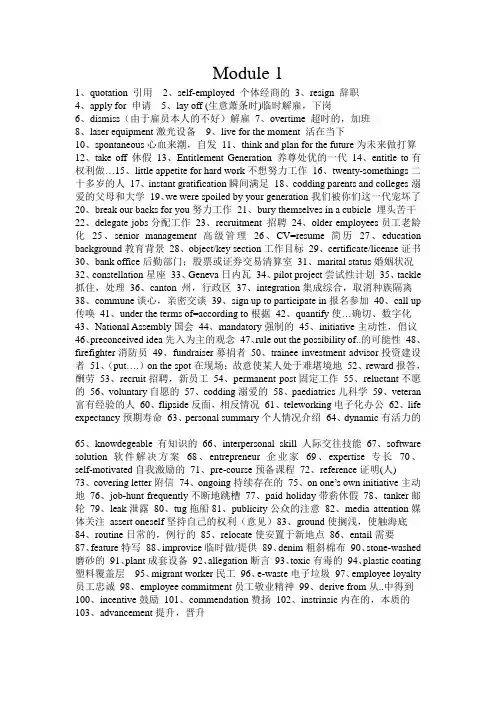
Module 11、quotation 引用2、self-employed 个体经商的3、resign 辞职4、apply for 申请5、lay off (生意萧条时)临时解雇,下岗6、dismiss(由于雇员本人的不好)解雇7、overtime 超时的,加班8、laser equipment激光设备9、live for the moment 活在当下10、spontaneous心血来潮,自发11、think and plan for the future为未来做打算12、take off 休假13、Entitlement Generation 养尊处优的一代14、entitle to有权利做…15、little appetite for hard work不想努力工作16、twenty-somethings二十多岁的人17、instant gratification瞬间满足18、codding parents and colleges溺爱的父母和大学19、we were spoiled by your generation我们被你们这一代宠坏了20、break our backs for you努力工作21、bury themselves in a cubicle 埋头苦干22、delegate jobs分配工作23、recruitment 招聘24、older employees员工老龄化25、senior management高级管理26、CV=resume简历27、education background教育背景28、object/key section工作目标29、certificate/license证书30、bank office后勤部门;股票或证券交易清算室31、marital status婚姻状况32、constellation星座33、Geneva日内瓦34、pilot project尝试性计划35、tackle 抓住,处理36、canton 州,行政区37、integration集成综合,取消种族隔离38、commune谈心,亲密交谈39、sign up to participate in报名参加40、call up 传唤41、under the terms of=according to根据42、quantify使…确切、数字化43、National Assembly国会44、mandatory强制的45、initiative主动性,倡议46、preconceived idea先入为主的观念47、rule out the possibility of..的可能性48、firefighter消防员49、fundraiser募捐者50、trainee investment advisor投资建设者51、(put….)on the spot在现场;故意使某人处于难堪境地52、reward报答,酬劳53、recruit招聘,新员工54、permanent post固定工作55、reluctant不愿的56、voluntary自愿的57、codding溺爱的58、paediatrics儿科学59、veteran 富有经验的人60、flipside反面,相反情况61、teleworking电子化办公62、life expectancy预期寿命63、personal summary个人情况介绍64、dynamic有活力的65、knowdegeable有知识的66、interpersonal skill人际交往技能67、software solution软件解决方案68、entrepreneur企业家69、expertise专长70、self-motivated自我激励的71、pre-course预备课程72、reference证明(人)73、covering letter附信74、ongoing持续存在的75、on one’s own initiative主动地76、job-hunt frequently不断地跳槽77、paid holiday带薪休假78、tanker邮轮79、leak泄露80、tug拖船81、publicity公众的注意82、media attention媒体关注assert oneself坚持自己的权利(意见)83、ground使搁浅,使触海底84、routine日常的,例行的85、relocate使安置于新地点86、entail需要87、feature特写88、improvise临时做/提供89、denim粗斜棉布90、stone-washed 磨砂的91、plant成套设备92、allegation断言93、toxic有毒的94、plastic coating 塑料覆盖层95、migrant worker民工96、e-waste电子垃圾97、employee loyalty 员工忠诚98、employee commitment员工敬业精神99、derive from从..中得到100、incentive鼓励101、commendation赞扬102、instrinsic内在的,本质的103、advancement提升,晋升Module 21、sales turnover/revenue营业额2、share capital股本3、market share市场份额4、number of outlets门店5、entry 网页,登录6、subsidiary子公司7、headquarter 总部8、division分部9、sale offices销售点10、be based in总部位于11、acquire/acquisition=take over收购12、merge/merge兼并13、go bankrupt破产14、after-sales services售后服务15、divest=sell off廉价出售16、close=shut down关闭17、logistic company物流公司18、organic growth内生增长19、non-organic growth非内生增长20、heap积累21、at the top of the heap=leader领导者22、blockbuster大公司23、completely=with no doubt=squarel正好24、aim at针对25、dominated主导的26、core database核心数据库27、application应用28、dig at挖苦,嘲笑29、at the heart核心30、industry行业31、innovation创新32、small-scale acquisition小型收购33、midmarket中阶市场34、since then自那以后35、kickoff(竞选等)活动开始、启动36、CA=California 37、bitter心酸的38、takeover bid竞价收购39、trying circumstance困难的境地/形势40、momentum势头lose momentum失去势头41、with class出众,优异a girl with class有出众风度的姑娘42、our heads hold high=be proud骄傲,自豪43、commentator评论家44、the way employees are rewarded奖赏方式45、tempo节奏46、throw sb.in at the deep end是某人在毫无准备的情况下做困难的事47、sum up总结48、accountable for=be responsible for对…负责49、in fairness公正地说50、paternalistic大家长式的51、wield the axe挥舞斧头,裁员52、get flak受到抨击53、territory领土53、stock brokers证券公司54、categorise分组,分类55、organisational culture企业文化56、sector行业57、crucial role关键作用58、developer开发商59、macho硬汉,男子汉气概60、devolve委派,下放61、hierarchies等级62、plodding拖拉63、bureaucracy官僚资本主义64、empower授权,许可65、job secruity工作稳定性66、measurable可测量的,重大的67、clear lines of reporting and areas of responsibility明确划分权限和职责范围68、non-financial rewards非金钱奖励69、informal relationship轻松关系70、present facts陈述事实71、speculation猜测72、post=announce宣布73、be in line with与..一致74、high street商业街75、quieter生意清闲的、清淡的76、flat生意不景气的77、retail outlets经销机构78、internet presence网络出口79、core competency核心竞争力80、market prospect市场前景81、market price市场价格82、cashflow资金流动83、profit margin利润率84、premise场所85、go out of business歇业86、go public挂牌上市87、divest使卸下88、blockbuster了不起的人89、headline头版重要新闻90、suite软件套件91、platform平台92、motto座右铭93、resigned屈从的,顺从的94、saga一长串事件95、conclusion结局96、insurance premiums保险费97、consensus一致意见98、charisma领袖气质99、one-top一站式的,提供一揽子商品(服务)的100、discreet言行谨慎的101、accessories装饰品102、profile简介103、poll 民意测验104、interpersonal skill交际能力105、time management skill时间管理能力106、problem-solving skill解决问题的能力107、customer service training 顾客服务培训108、knowledge industry知识产业109、textile industry纺织行业110、information industry信息行业111、raw material extraction industry原材料开采行业Module 31、make/receive a phone call2、issue/put out a press release3、launch/run anadvertisement 4、give/make a presentation 5、hold/attend a meeting/seminar6、produce/publish a report7、send out/circulate a memo to all concerned 9、post/put information on the internet 10、make economies节省11、elaborate复杂的,详尽的12、means of communication沟通方式13、make of理解,看待14、investment portfolio证券投资组合15、get a good point说得有道理16、utility公用事业17、crosssell交叉销售18、more….than….与其说…不如说…. 19、call center呼叫中心20、bill enquiry账单查询21、counter-productive产生相反效果的22、depersonalise没有人情味23、commoditise使商品化24、rationlise使合理化25、transaction交易26、bank deposits银行储蓄27、cash withdrawals现金支取28、issuing of statements结单通知29、cash machine取款机30、driver动力31、high street shopping实体店购物32、start out/off开始谋业33、embrace拥抱;欣然接受34、train times火车时刻表35、Alaska阿拉斯加36、SMS=short messaging service短信37、MSN=Microsoft Service Net微软公司38、Blackberry黑莓手机39、managing director总经理40、make a request请求41、give sb.a reminder提醒某人42、make a proposal建议;订婚43、make an announcement通知44、make a demand要求45、customer charter顾客约章46、confidential机密的47、national and local calls长途与本地电话48、refund the difference退还差价49、impartial公正的50、satisfaction survey顾客满意度调查51、straightway立即,马上52、come straight back马上回来53、activate激活54、parcel delivery company包裹邮递公司55、a fish tank鱼缸56、mail order company邮购公司57、air pump气泵58、the service department服务部59、electricity company供电公司60、unsolicited未经要求的,主动提供的61、laptop computer笔记本电脑62、aquarium水族馆63、fitness club健身俱乐部64、iron熨斗65、nevertheless=still 66、consequently=so 67、owing to=because of 68、moreover=what’s more 69、following=after 70、since=because 71、besides=anyway 72、receptionist 接待人员73、doormen门卫74、existing staff现有的员工75、customer behavior 消费行为76、telephone operator接线员77、handset手机78、accredit相信,认可Module 41、aptitude能力2、altitude高度3、detour绕弯路4、dead-end street死胡同5、price competition价格战6、selling point卖点7、competitive advantage竞争优势8、emotional/perceived benefits情感利益9、added value附加值10、prospective customer潜在的顾客11、buying signal成交信号12、car dealer汽车行13、close the sale成交14、reserve the order预定15、deposit定金16、build/establish trust建立信任17、spaceship飞船18、VW大众19、suit one’s image 符合身份20、hard sell强硬销售21、deodorants除臭剂22、advertiser广告商23、march行进,行军24、ubiquity普遍存在25、digital revolution数字革命26、upsurge高潮27、in favor of支持;宁愿选择28、television viewing电视收视率29、personal video recorder technology(PVR)录像机30、medium媒体31、material影响深远的32、the sharp end激进分子33、Unilever联合利华34、Internet budget网络预算35、direct response advertising直效广告36、the consumer goods giant消费品巨头37、sponsorship赞助38、long-running持续时间长的39、make its presence felt使周围的人感觉你的重要性40、rewind倒退41、fast forwarding快进42、on demand有求必应43、search-based advertising 基于搜索的广告44、receptive乐于接受的45、huge premium巨额保费46、tune in to调整,调台47、Dancing on Ice花样滑冰48、engage针对49、catch-all包罗万象的50、holistic整体的,全面的51、tap into开发52、social networking sites交友网站53、feel compelled to do sth.情不自禁干某事54、come of age到达法定年龄、成年;到达成熟时期55、in the short term从短期来说56、creat a buzz 造势57、clip夹子,回形针58、present figures描述业绩59、roller coaster过山车60、fluctuate=go up and down=vary上下起伏61、pick up=recove=bounce 恢复62、hit=reach 63、high point=peak 64、due to=because of=owing to=down to 65、over=during=in 66、overdrive加速,赶工67、stabilish=level off 68、clear out our stock清仓69、up to=as much as 70、result in=lead to 71、pharmaceutical制药的72、forecast预计73、best-selling最畅销的74、eye contact眼神交流75、curve 曲线76、what general trend大概趋势77、per capita人均的78、connect with=relative to与…相关79、decision maker决策者80、option选用件81、reliability可靠性82、prospect可能成为主顾的人83、constraint限制,约束84、anecdote轶事,趣闻86、pushy粗鲁的,莽撞的87、payment terms支付方式88、niche专门市场89、point-of-sale销售网点90、viral marketing病毒式营销91、vehicle advertising车辆广告92、banner ads横幅广告93、broadband宽带94、media company传媒公司95、commission佣金96、across the board全面地97、blues忧郁,沮丧98、given考虑到99、slow-release(药效)缓慢的释放100、disruption扰乱101、supply chain供应链102、in reserve被留出备用103、margin利润104、palm oil棕榈油105、supply and demand供应与需求106、ingredient配料Module 51、flow chart流程图2、invoice发票;开发票3、owe money欠钱4、take out获得5、bet money on a horse赌马6、withdraw money取钱7、bank manager 银行经理8、interest rate利息9、term条款10、security担保11、save rate 存款率12、consumer confidence index消费者信心指数13、credit信贷;信用证;学分14、oversee监督15、legacy遗产,遗留物16、remortgage再次抵押17、thrillion万亿18、down-payment首次付款(首付)19、asset values(资产价值) will crash资产价值崩溃20、equity财产净值;股票;所有者权益21、negative equity负债资产22、by far最,无疑,很23、so far到达某一程度so far so good到目前为止,一切都好24、flyover立交桥25、gas-guzzling cars 滥吃狂饮26、equation方程式,影响因素27、leverage影响力28、location 地点29、seating capacity座位容量30、current cost of a ticket当前票价31、lease租约32、turnover营业额34、expenditure支出,income收入35、variable costs可变成本,fixed costs固定成本36、assets资产,liabilities负债37、gross 毛重,net净重38、current当前的,long-term长期的39、profit利润,loss 亏损40、dividends红利,retained profit留存利润41、creditor债权人,debtor 债务人42、profitable盈利的,unprofitable亏损的43、accounts payable应付账款,accounts receivable应收账款44、financial statement财务报表45、health 运营状况46、your first port of call(沿途要落脚/拜访的地方)你首先要看的是47、the accounts财务报表48、balance sheet资产负债表49、the income statement=the profit and loss accounts所得计算书50、cashflow statement现金流表51、snapshot简要说明;快照52、at a given moment=over a given period 在某一特定时期53、owe to欠54、set sth. against sth.把…与…联系起来55、current asset流动资产56、the notes to the accounts账目记录57、run the business经营58、gross profit毛利润,net profit净利润59、proverbial众所周知60、profit after tax税后利润61、calculator计算器62、the bottom line 底线63、do some sums算一算是否有钱去做….64、total revenue/turnover总收入65、operating income营业收入66、current liabilities流动负债67、starting line开办费用68、cash from operating经营产生的现金69、cash from investing 投资产生的现金70、cash from financing融资产生的现金71、net change in cash净现金流72、material costs材料成本73、administrative costs管理费用74、distribution costs运输成本75、overheads日常开支76、development costs 开发成本77、finance costs财务成本78、advertising expenditure广告花销79、free samples免费样品80、bank charges银行手续费81、vehicle insurance 车辆保险82、heating加热,供暖设备83、make reductions缩减84、car hire company汽车出租公司85、compromise妥协86、napkin纸巾87、consumer spending消费者支出88、avert挡开89、gallon加仑90、equation综合体91、multipex多剧场影剧院92、research and development expenditure研究与开发费用93、operating expenses营业费用94、manufacturing costs生产成本95、shopping mall大型购物中心96、hole漏洞97、blue-chip(股票)热门的98、hindsight事后的认识。

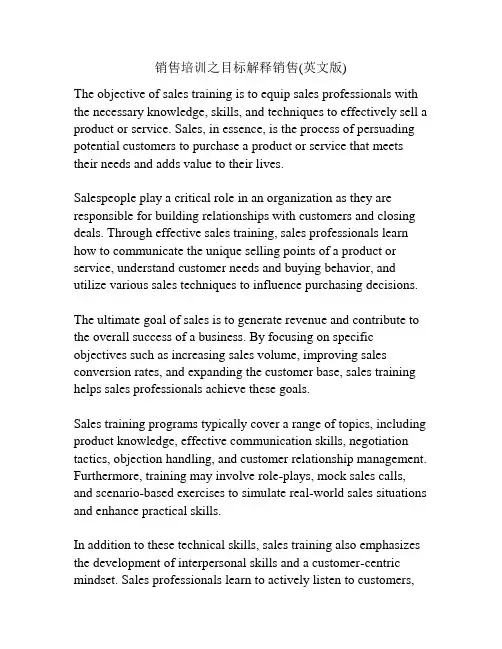
销售培训之目标解释销售(英文版)The objective of sales training is to equip sales professionals with the necessary knowledge, skills, and techniques to effectively sell a product or service. Sales, in essence, is the process of persuading potential customers to purchase a product or service that meets their needs and adds value to their lives.Salespeople play a critical role in an organization as they are responsible for building relationships with customers and closing deals. Through effective sales training, sales professionals learn how to communicate the unique selling points of a product or service, understand customer needs and buying behavior, and utilize various sales techniques to influence purchasing decisions.The ultimate goal of sales is to generate revenue and contribute to the overall success of a business. By focusing on specific objectives such as increasing sales volume, improving sales conversion rates, and expanding the customer base, sales training helps sales professionals achieve these goals.Sales training programs typically cover a range of topics, including product knowledge, effective communication skills, negotiation tactics, objection handling, and customer relationship management. Furthermore, training may involve role-plays, mock sales calls, and scenario-based exercises to simulate real-world sales situations and enhance practical skills.In addition to these technical skills, sales training also emphasizes the development of interpersonal skills and a customer-centric mindset. Sales professionals learn to actively listen to customers,build rapport, and understand their unique needs and preferences. By doing so, they can tailor their sales approach and provide personalized solutions, ultimately enhancing customer satisfaction and loyalty.Ultimately, sales training serves the purpose of empowering sales professionals to excel in their roles by increasing their confidence, competence, and effectiveness. It equips them with the necessary tools and knowledge to maximize sales opportunities, build relationships with customers, and meet the organization's sales objectives. Through continuous training and development, sales professionals can continuously evolve and adapt to changing market dynamics, ensuring long-term success in their careers.Sales training plays a crucial role in ensuring the success of sales professionals and ultimately, the growth of a business. Let's explore some key aspects of sales training in more detail.Firstly, product knowledge is essential for sales professionals. They need to fully understand the features, benefits, and value propositions of the products or services they are selling. This knowledge allows them to effectively communicate the unique selling points and address customer concerns or objections. Sales training programs provide a deep dive into product knowledge, enabling salespeople to confidently present and promote their offerings.Effective communication skills are also critical in sales. Sales professionals need to be able to articulate their message clearly, listen actively to customers' needs, and adapt their communication style to build rapport. Sales training focuses on enhancing verbaland nonverbal communication skills, teaching techniques such as active listening, asking open-ended questions, and delivering persuasive presentations. By honing these skills, salespeople can establish a connection with customers, gain their trust, and influence their buying decisions.Negotiation is another crucial aspect of sales. During the sales process, customers may have specific requirements, concerns, or budget limitations. Skilled negotiators can find creative solutions that meet both the customer's needs and the organization's objectives. Sales training programs teach negotiation tactics, such as finding win-win scenarios, using persuasive language, and handling objections effectively. These skills empower sales professionals to navigate through difficult conversations and close deals successfully.Objection handling is an inevitable part of the sales process. Customers may have doubts, reservations, or questions that need to be addressed before making a purchase. Sales training equips salespeople with strategies and techniques to handle objections confidently. They learn how to empathize with the customer's concerns, provide accurate information, and offer solutions or alternatives. By effectively addressing objections, sales professionals can overcome customer hesitations and move closer to closing the sale.An important aspect of sales is building and maintaining customer relationships. Repeat business and referrals are often the lifeblood of sales organizations. Sales training emphasizes the importance of relationship management, showing sales professionals how tonurture long-term relationships with customers. They learn how to understand customer needs, anticipate future requirements, and provide ongoing support. By focusing on customer satisfaction and building trust, sales professionals can improve customer retention and achieve greater success.Sales training programs often incorporate role-plays, mock sales calls, and scenario-based exercises. These activities simulate real-world sales situations, allowing sales professionals to practice their skills in a controlled environment. By experiencing different scenarios and receiving feedback from trainers or peers, salespeople can refine their approach, learn from their mistakes, and gain confidence in their abilities.Furthermore, sales training should be an ongoing process. Sales professionals should continuously update their knowledge and skills to stay competitive in a rapidly evolving market. Regular training sessions, workshops, and coaching can help salespeople keep up with industry trends, product updates, and changing customer behaviors. By investing in continuous learning and development, organizations can ensure that their sales team remains agile and adaptable.In conclusion, sales training is essential for equipping sales professionals with the knowledge, skills, and techniques to excel in their roles. Through comprehensive training programs, salespeople develop product knowledge, communication skills, negotiation tactics, objection handling techniques, and customer relationship management capabilities. By applying these skills effectively, sales professionals can generate revenue, build strong customerrelationships, and contribute to the overall success of the organization. Continued training and development are crucial to staying competitive in the ever-changing sales landscape.。
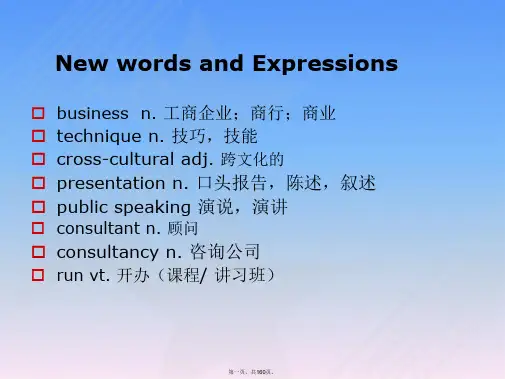
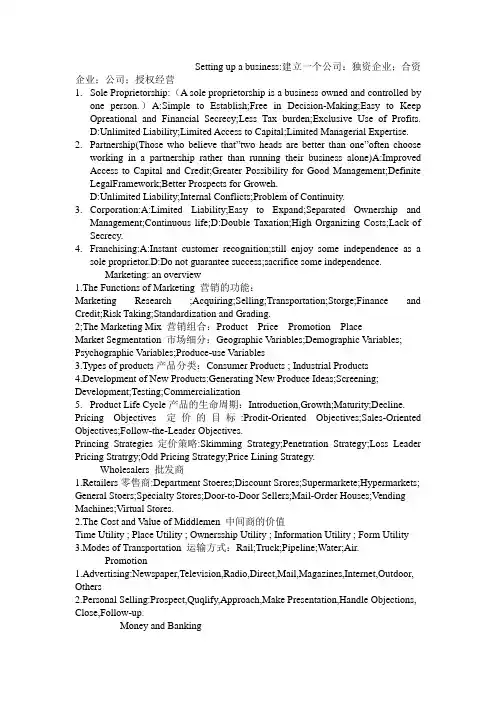
Setting up a business:建立一个公司:独资企业;合资企业;公司;授权经营1.Sole Proprietorship:(A sole proprietorship is a business owned and controlled byone person.)A:Simple to Establish;Free in Decision-Making;Easy to Keep Opreational and Financial Secrecy;Less Tax burden;Exclusive Use of Profits.D:Unlimited Liability;Limited Access to Capital;Limited Managerial Expertise. 2.Partnership(Those who believe that”two heads are better than one”often chooseworking in a partnership rather than running their business alone)A:Improved Access to Capital and Credit;Greater Possibility for Good Management;Definite LegalFramework;Better Prospects for Groweh.D:Unlimited Liability;Internal Conflicts;Problem of Continuity.3.Corporation:A:Limited Liability;Easy to Expand;Separated Ownership andManagement;Continuous life;D:Double Taxation;High Organizing Costs;Lack of Secrecy.4.Franchising:A:Instant customer recognition;still enjoy some independence as asole proprietor.D:Do not guarantee success;sacrifice some independence.Marketing: an overview1.The Functions of Marketing 营销的功能:Marketing Research ;Acquiring;Selling;Transportation;Storge;Finance and Credit;Risk Taking;Standardization and Grading.2;The Marketing Mix 营销组合:Product Price Promotion PlaceMarket Segmentation 市场细分:Geographic Variables;Demographic Variables; Psychographic Variables;Produce-use Variables3.Types of products产品分类:Consumer Products ; Industrial Products4.Development of New Products:Generating New Produce Ideas;Screening; Development;Testing;Commercialization5.Product Life Cycle产品的生命周期:Introduction,Growth;Maturity;Decline. Pricing Objectives 定价的目标:Prodit-Oriented Objectives;Sales-Oriented Objectives;Follow-the-Leader Objectives.Princing Strategies定价策略:Skimming Strategy;Penetration Strategy;Loss Leader Pricing Stratrgy;Odd Pricing Strategy;Price Lining Strategy.Wholesalers 批发商1.Retailers零售商:Department Stoeres;Discount Srores;Supermarkete;Hypermarkets; General Stoers;Specialty Stores;Door-to-Door Sellers;Mail-Order Houses;Vending Machines;Virtual Stores.2.The Cost and Value of Middlemen 中间商的价值Time Utility ; Place Utility ; Ownersship Utility ; Information Utility ; Form Utility 3.Modes of Transportation 运输方式:Rail;Truck;Pipeline;Water;Air.Promotion1.Advertising:Newspaper,Television,Radio,Direct,Mail,Magazines,Internet,Outdoor, Others2.Personal Selling:Prospect,Quqlify,Approach,Make Presentation,Handle Objections, Close,Follow-up.Money and Banking1.Money:portability,divisibility,stability,durability,acceptability.Printed paper纸币,metal coins硬币2.what does money do?medium of exchange,a store of value,a unit of account3.Types of Money钱的分类:M-1:currency,demand deposits,and other checkabledeposits现金,活期存款,支票存款;Time deposits定期存款。
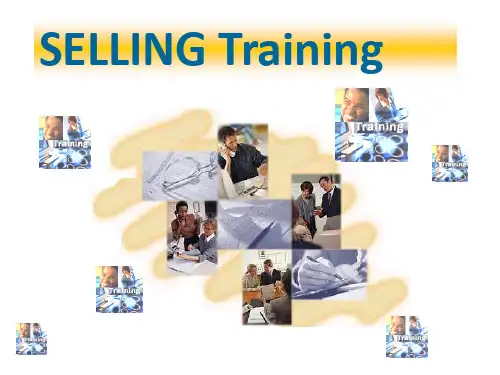
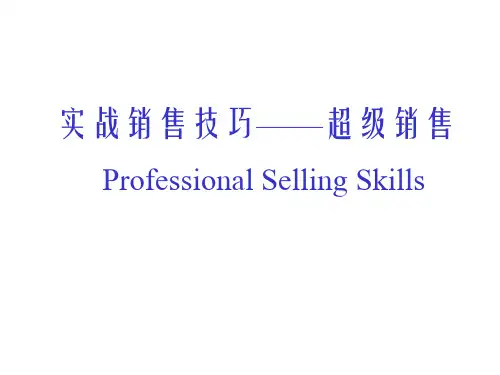
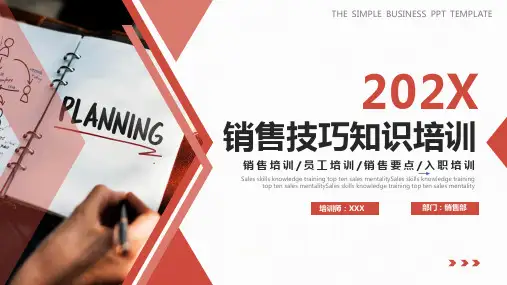
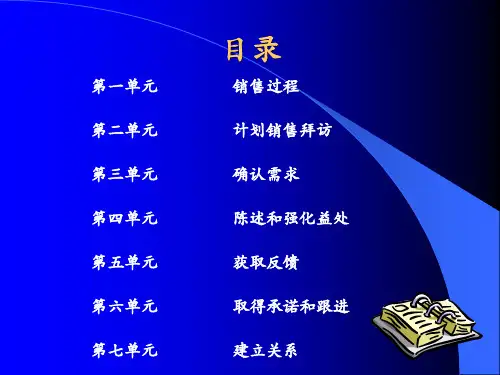
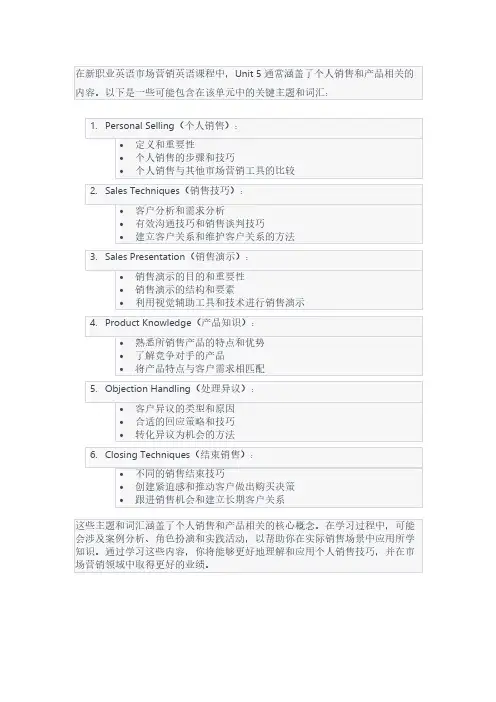
WHAT IS A PERSONAL SELLING?Personal selling is direct communication between a sales representative and one or more prospective purchasers, for the purpose of making a sale. This can be accomplished through a face-to-face, personal sales call or over the telephone, called telemarketing.ADVANTAGES OF PERSONAL SELLING§Personal selling can be used to provide a detailed explanation or demonstration of the product.§The message can be varied by the salesperson to fit the motivations and interests of each prospect.§Personal selling can be directed to specific qualified prospects.§Personal selling costs can be controlled fairly easily by adjusting the size of the sales force; if paying salespeople on a straight commission, the firm does not incur a sales expense until the sale is made.§Personal selling is most effective in closing the sale and getting the customer order. §Certain customer and product characteristics indicate that personal selling might work better than other forms of promotion. In general, personal selling is more important if the product has a high value, the product is custom-made, the product is technically complex, there are few customers, and customers are concentrated.STEPS IN THE SELLING PROCESSSteps focus on the goal of getting new customers and obtaining orders from them.A. Prospecting and Qualifying§Identifying qualified potential customers.§Finding current customers for the names of prospects to build referral sources. Or they can drop in unannounced on various offices (a practice known as “cold calling”)§Qualifying – how to identify the good ones and screen out the poor ones. Prospects can be qualified by looking at their financial ability, volume of business, special needs, location, and possibilities for growth.B. Preapproach§Before calling on a prospect, the salesperson should learn as much as possible about the organization (what it needs, who is involved in the buying) and its buyers (their characteristics and buying styles).§Set call objectives.§Decide on the best approach (personal visit, phone call, letter) and timing.C. Approach§During the approach step, the salesperson should know how to meet and greet the buyer and get the relationship off to a good start. This step involves the salesperson’s appearance, opening lines, and the follow-up remarks.D. Presentation and Demonstration§During the presentation step of the selling process, the salesperson tells the product “story” to the buyer.The salesperson describes the product features but concentrates on presenting customer benefits.§Sales presentations can be improved with demonstration aids, such as booklets, flip charts, slides, videotapes or videodiscs, and product samples.E. Handling Objections§Customers almost always have objections during the presentation or when placing an order. In handling objections, the salesperson should use a positive approach, seek outhidden objections, ask the buyer to clarify any objections, use objections as opportunities to provide more information, and turn the objections into reasons for buying.F. Closing§After handling the prospect’s objections, the salesperson now tries to close the sale. Salespeople should know how to recognize closing signals from the buyer, including physical actions, comments, and questions.G. Follow-up§The last step is necessary if the salesperson wants to ensure customer satisfaction and repeat business. The salesperson should then schedule a follow-up call when the initial order is received to make sure that there is proper installation, instruction, and servicing. This visit should reveal any problems, assure the buyer of the salesperson’s interest, and reduce any buyer concerns that might have arisen since the sale.RELATIONSHIP MARKETING1. The principles of personal selling as just described are transaction oriented; their aim is to help salespeople close a specific sale with a customer.2. Most companies today are moving away from transaction marketing. Instead, they are practicing relationship marketing, which emphasizes maintaining profitable long-term relationships with customers by creating superior customer value and satisfaction. They are realizing that, when operating in maturing markets and facing stiffer competition, it costs a lot more to wrest new customers from competitors than to keep current customers.3. The company would like to show the customer that it has the capabilities to serve the customer over the long haul, in a mutually profitable relationship.4. Companies are recognizing that winning and keeping accounts requires more than making good products and directing the sales force to close lots of sales. It requires a carefully coordinated, whole-company effort to create value-laden, satisfying relationshipswith important customers. Relationship marketing is based on the premise that important accounts need focused and continuous attention.。
介绍做销售的技巧英语作文Title: Effective Sales Techniques。
Salesmanship is an art that requires a combination of skills, strategies, and interpersonal abilities. Whetheryou're selling a product, service, or idea, mastering effective sales techniques can significantly boost your success. Here, we delve into some key strategies for achieving sales excellence.1. Understand Your Audience: The foundation of successful sales lies in understanding your target audience. Conduct thorough research to identify their needs, preferences, pain points, and motivations. Tailor your approach and pitch to resonate with their specificinterests and concerns.2. Build Rapport: Establishing a rapport with your prospects is essential for building trust and credibility. Start conversations on a friendly note, actively listen totheir needs, and empathize with their challenges. Show genuine interest in their concerns to create a positive connection.3. Effective Communication: Clear and concise communication is paramount in sales. Articulate your message in a way that is easy to understand and resonates with your audience. Highlight the benefits of your product or service and address any objections or doubts promptly.4. Highlight Value Proposition: Emphasize the unique value proposition of your offering. Clearly articulate how it addresses the needs and solves the problems of your prospects better than competitors. Focus on the benefits rather than just features to showcase the value it brings.5. Utilize Sales Techniques: Employ proven sales techniques such as the "feel, felt, found" method or the "feature, advantage, benefit" approach to guide your conversations and presentations. These techniques help you empathize with prospects, address objections effectively, and highlight the value proposition.6. Follow-up and Persistence: Many sales are lost dueto a lack of follow-up. After initial contact, maintain regular communication with prospects to nurturerelationships and address any concerns. Persistence is keyin sales, as it often takes multiple touchpoints before a prospect converts into a customer.7. Adaptability and Flexibility: Adaptability iscrucial in the ever-changing landscape of sales. Beprepared to adjust your approach based on the feedback and responses of your prospects. Flexibility allows you totailor your pitch to different personalities, situations, and objections.8. Continuous Learning: Stay updated on industry trends, competitor strategies, and sales techniques through continuous learning. Attend workshops, seminars, andtraining programs to hone your skills and stay ahead of the curve in the dynamic world of sales.9. Effective Use of Technology: Leverage technologytools such as CRM software, email marketing platforms, and social media channels to streamline your sales process and reach a wider audience. Embrace digital tools that enhance productivity, organization, and communication with prospects.10. Provide Excellent Customer Service: Salesmanship extends beyond closing deals; it involves building long-term relationships with customers. Provide excellent customer service by addressing their inquiries promptly, resolving issues effectively, and maintaining a positive attitude at all times.In conclusion, mastering effective sales techniques requires a combination of empathy, communication skills, adaptability, and persistence. By understanding your audience, building rapport, highlighting value, and leveraging technology, you can enhance your sales performance and achieve greater success in your endeavors. Remember, salesmanship is not just about selling; it's about creating value and building lasting relationships with customers.。
(1.0)Background:Since the 1970s, sales researchers and academicians have begun to conduct empirical researched studies and have developed many theoretical models, frameworks and concepts. Recent findings’ believes that in the new century, salespeople require new skills and knowledge in order to survive and compete in this rapid growing modernized marketplace. They also believe that old traditional ways will not work well and those who base on folklore and intuition, were mostly unsuccessful. (Johnston and Marshall, 2010, Cron and Decarlo, 2010, Jobber and Lancaster, 2009, Futrell, 2001, Darmon, 2007). Other studies emphasize on personal experiences and base proven facts. (Blades, 2006, Hopkins, 2005, Salmon, 2006, Nelson, 2006, Gschwandtner, 2007, Schiffman, 2009, Hopkins, 2010). It is therefore vital for us to understand the miracles of incentives and rewards for salespeople. (Nelson, 2005, Zoltners et al, 2006).(2.0)Literature Review:The Opening:The word “opening” can be defined as “approaching” in the selling or sales perspectives. It is crucial for every salesperson to prepare themselves before facing their customer. There are many concerns need to be addressed before entering a sales presentation or demonstration. Sales researchers believe that image, manners, attitudes, confident and information gathered, are all important elements, as it will affect the impression of customers towards the salesperson. Salmon (2006) in his book ‘super networking for sales PROS,’ indicates that smiling, having strong eye contacts, and to extend their hand before customer; will create a positive, friendly and professional image or impression for customer. Besides, carefully plan what to say and how to say is also an important element for approaching, a salesperson should have enough “rol e-play” or practice with their superior, make sure it look good before actual approach (Futrell, 2008). Plan and review important question before meeting the prospect is one of the vitally important elements need to be addressed. Because it is an “unfamiliar” prospect, awell structured preparation will definitely put a salesperson in a better position. Researcher believes that three-quarters of a salesperson’s time must be invested in the work before presentation, make sure the prospect is the right person to make decision, qualify the prospect to ensure they are able to pay and make sure they are ready and desire to purchase the products/services and not in future. Finally, let them aware that the salesperson is expecting to close the sales after a formal presentation. Do not rush for presentation if the salesperson is unprepared, a good salesperson should always verify the information they have collected/gathered, make sure it is real and accurate (Schiffman, 2005; Johnston and Marshall, 2010; Hopkins, 2010; Nelson, 2006; Futrell, 2008; Richardson, 1998).Needs and Problems Identification:Therefore, in order to find out the needs and identifying customers' problems, a good salesperson should learn how to be a good listener or a 'listening salesperson', by asking appropriate and related questions which will directly and/or indirectly lead to the products/services they sell. Reading the customer's mind, observing their facial reaction, body reactions and listening to them, are all-important elements towards critical skills for every salesperson to know and master. Whereas, for a 'talking' salesperson, they will not be able to know or understand much about their customers' needs and problems, and insufficient information and clues, will create unnecessary objection and/or hindrances during the next stage - Sales Presentation Process. The followings are some basic points on listening skills:∙Body language. Good salespeople are able to understand their customers by watching their facial reaction for examplesimpatient, tired, and interested or when customer feels excitedabout their presentation.∙Showing interest and alertness. Eye contacts, leaning forward, taking notes, are ways to tell customers that thesalesperson is interested and listening to their problems.∙Eliminate Distractions. Good salespeople should not bring in their personal problems into their presentation; they should clear their mind before meeting customer.∙Delay interpretation. Too often, some salespeople without understand much about the customers’ problems or needs;simply jump to conclusion and try to close the sale. They should put themselves in the customers’ shoes, how well they know about the products/services and how they perceived it, before conclusion.∙Put aside personal opinion. Do not argue with customer on some unrelated topic during the needs and problems finding stages. Sharing ideas will be a good way to know customer better, most important message is the products/services suits the customers’ needs and problems.∙Avoid Expectations. Avoid assumption that customers will be interested on the product/services or force-fit what customer is saying into some preconceived product/services. A good salesperson will always find out the ‘actual’ needs and problems from their prospect and make appropriate recommendations.∙Check your understanding. Some salespeople may misunderstand what their customers’ needs and problems.They should reconfirm by clarifying with their customers.Hence, listen perfectly does not mean understand perfectly.∙Boost your memory. Take important notes during finding stage, especially to a new salesperson. These could help them to recall what have been identified earlier (Farber, 2006;Manning and Reece, 2008; Darmon, 2007; Futrell, 2008).Before entering into sales presentation, a salesperson should qualify their prospect by determining whether the customer has a ‘need’ on the product or service he/she sell, and well understanding on who is the competitors and where is the marketplace (Johnston and Marshall, 2010; Cron and Decarlo, 2010).Another ways to identifying the needs and problems are to ask questions: what is the problem customers encountered, why customer needs the products/services, in what areas and why? Basing on their answers, immediately develop a solution with the salesperson’s expertise. Salespeople can think of the value of their company’s products/services; the resources, facilities, advantages, strengths…etc, which are possible to solve their problems/needs. Do a ‘self-analysis’ fast to response their needs/problems and make sure it stands out from their competitors (Salmon, 2006).According to Hopkins, a good salesperson has a strong believe in the product/service he sells and possess strong passion, feel proud about his profession as it is a ‘helping profession.’ He believes that sales job is in fact, helping people acquire products/services that meet their needs (Hopkins, 2010).DemonstrationIn order to strengthen the demonstration, salesperson need to make use of communication tools, such as word pictures, stories, humor, charts, models, samples, gifts, catalogs, brochures, ads, maps, visual and audio aids and illustrations; testimonials; make use of IT to give a powerful demonstration; how to create good handouts; how to write effective proposals; and develop solutions for all the issues (Weitz et al, 2004; Futrell, 2008; Marks, 1997; Jobber and Lancaster, 2009; Farber, 2006; Schiffman, 2009; Richardson, 1990; Hopkins; 2005; Gitomer, 2003; Dugdale and Lambert, 2007; Smolen, 2000; Soldow and Thomas, 1991; ). According to Johnston and Marshall (2010), there are five common mistakes salesperson always encounter: salespeople like to run down their competitors; they tend to be too aggressive and abrasive; insufficient knowledge of it s competitors’ products and services;insufficient knowledge of the client’s business or organization and delivering poor presentations. Researchers proposed a ‘pre-demonstration,’ which will prepare salesperson before the actual demonstration: the process must be as brief and simple as possible; role play or rehearse the presentation/demonstration with colleagues; know and emphasize the product’s selling points; predict what will go wrong, or develop a back-up solution as contingency (Schiffman, 2009; Jobber and Lancaster, 2009; Still et al. 1983). While conducting the demonstration, make sure it is concise and interesting, and demonstrate how the product or service able to satisfy the needs of customer. Do not leave the customer until they are fully understand and satisfied with the demonstration. Summarize the main points by re-emphasizing the ‘purchasing benefits’ rather than sales benefits (Jobber and Lancaster, 2009; Futrell, 2008; Cron and Decarlo, 2010; Darmon, 2007).Trial Closing and Objection SolvingSome researchers believe that a good salesperson should ‘plan for objections,’ it should consider not only the reasons customer should buy, but also why they should not buy. These have to be done with a role play or rehearsal, and develop solutions towards the objections. It is better to discuss and answered the objections before arise during the actual demonstration. Be a good listener, by listening to the prospect’s view, even it is mistake or negative information. Do not cut or interrupt their conversation, as this may cause irritation and unprofessionalism. Salesperson need to understand the reasons of objection, whether it is to request for more information, a condition, a genuine or false reasoning. There are six major categories of objections most salesperson will encounter: the hidden objection, the stalling objection, the no-need objection, the money objection, the product objection and the source objection (Futrell, 2008; Hopkins, 2005; Marks, 1997; Jobber and Lancaster, 2009; Weitz et al, 2004; Futrell, 2001; Farber, 2006; Schiffman, 2009; Tracy, 2007; Richardson, 1990; Smolen, 2000; Futrell, 2008).Closing the SalesAfter the salesperson has finished the presentation/demonstration, the prospect’s response to the trial close indicates t hat all objections have been solved, and then the next step is to close the sales. Oppositely, if the salesperson cannot overcome an objection, then it is advisable to move back to the presentation, identify their objection and solve their objection (Futrell, 2008; Richardson, 1990). Schiffman (2009) believes by using “closing tricks” on the closing stage will work for some people, such as leaving the product to the prospect for a week to try out, and expecting the sales later. Tracy (2007) mentioned that t he best closing techniques are “The Ascending Close,” which asks questions that lead to a “Yes” answers. These must be done at the beginning, and through the presentation that incorporate the benefits of the product or services. The prospect will often be completely convinced of the goodness and value of it. He also proposes “The Invitational Close,” by offering the prospect to ‘give it a try,’ and this usually sounds an easier decision to make, than to buy (Jobber and Lancaster, 2009; Futrell, 2008; Johnston and Marshall, 2010; Nelson, 2006; Schiffman, 2009).。